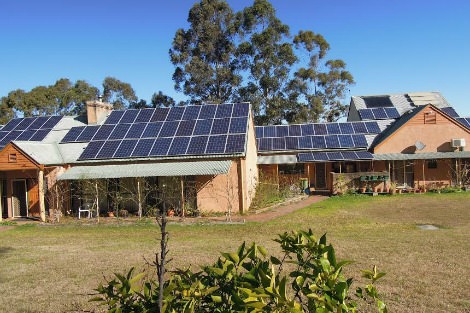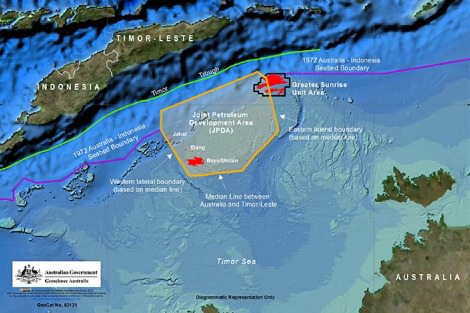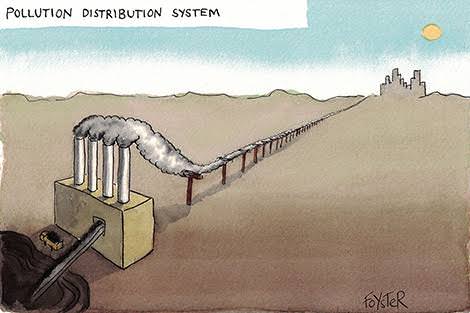Keywords: Gas
There are more than 200 results, only the first 200 are displayed here.
-

ENVIRONMENT
- Greg Foyster
- 17 November 2016
5 Comments
Here we go again. Just a few days after the historic Paris Agreement on climate change entered force, another Republican climate denier has snatched the White House. Donald Trump isn't just a closet sceptic, paying lip-service to climate change while doing nothing about it. He's an out-and-proud conspiracy theorist. All signs point to the US returning to its role as international climate saboteur, and for much the same reasons: Republican paranoia over the economic rise of China.
READ MORE 
-

INTERNATIONAL
- David James
- 10 November 2016
17 Comments
The first step for a business person is to make the sale, usually by over-promising and tapping into the emotional triggers of the customer. That is what Trump did. Over and over, he assured everyone that electing him would be 'fantastic'; he would deliver; customer-value is in the bag. The next step, once the sale is made, is for a hard financial logic to be applied. Trump's hype will be, at the very least, toned down. Once the customer has coughed up, business people typically become extremely pragmatic.
READ MORE 
-

AUSTRALIA
- Adolfo Aranjuez
- 28 October 2016
10 Comments
After sending me to live in Australia, my father tasked my then brother-in-law (a true-blue 'bloke') with teaching me to 'be a man'. He failed, but here was evidence of hegemonic masculinity's perpetuation. My father and I were born into a masculine culture that, unlike Australia's stoicism, is characterised by braggadocious chest-puffing. Yet underpinning both Australia's and the Philippines' conceptions of masculinity is the masking of vulnerability: emotions hide behind silence and bravado.
READ MORE 
-

ENVIRONMENT
- Greg Foyster
- 21 October 2016
10 Comments
On 28 September an extreme storm lashed South Australia and the entire state lost power. How could this have happened? It's a question that has occupied the country for the last three weeks as politicians and commentators have peddled their unqualified opinions in an escalating culture war about the role of renewable energy. No one really knew what had happened until Wednesday this week, when the AEMO released its updated report. Even now, there are more questions than answers.
READ MORE 
-

INTERNATIONAL
- Frank Brennan
- 27 September 2016
19 Comments
Timor has scored another win in the international legal forum, this time before a five-member Conciliation Commission convened under the auspices of the Permanent Court of Arbitration. In response, George Brandis and Julie Bishop regurgitated the Canberra mantra: 'We have a strong interest in Timor-Leste's stability and growing prosperity, and in providing a stable and transparent framework for investment in the Timor Sea.' They have no idea just how patronising this sounds in Dili.
READ MORE 
-

ENVIRONMENT
- Thea Ormerod
- 09 September 2016
10 Comments
With the grip of climate change tightening, few seem to understand the urgency of the crisis. This is why the announcement of over 3500 churches in the UK switching to clean power is so significant. At last, a solution presented by religious communities that matches the scale of the problem. They are providing the kind of leadership for the needed transition to an ecologically sustainable future. Unfortunately, one reason why it is so exciting is that we're nowhere near this in Australia.
READ MORE 
-

RELIGION
- Ann Deslandes
- 02 September 2016
19 Comments
Many Brazilians remember the 'Red Bishop' as much more than a defender of human rights. For these people, Helder Camara is included reverently in the litany of rogues who drew the ire of church and state authorities by demanding both do a better job of embodying a message of social justice. It was a powerful idea to grow up with: that this imposing and defining institution I had been born and baptised into contained a rebellious truth that often demanded we go against the institution's own grain.
READ MORE 
-

INTERNATIONAL
- Paul Cleary
- 01 September 2016
2 Comments
As Australia and East Timor met overnight at the Permanent Court of Arbitration in The Hague, the Britain-Norway settlement of the 1960s provides an instructive case study of how to resolve the dispute over oil and gas fields in the Timor Sea. Norway had feared its big neighbour would exploit a deep trench near its coastline and push the boundary beyond halfway. Instead, the Norwegian negotiators were stunned when Britain offered the median line as the starting point for negotiations.
READ MORE 
-

AUSTRALIA
- Kate Galloway
- 26 August 2016
15 Comments
Oliver Twist is still used to aid understanding of the trauma arising from poverty, and the suffering of children at the hands of individuals and within institutional settings. In broader Australian society we assume Dickensian attitudes to children have evolved. Aligned with the sentiments behind child protection, society's image of children and childhood is idyllic. Yet beneath this veneer lies a substratum of deeply ambivalent, even malevolent, attitudes towards children with a distinctly Dickensian flavour.
READ MORE 
-

ENVIRONMENT
- Greg Foyster
- 26 August 2016
8 Comments
On 7 July, South Australia experienced a cold snap. As residents turned on their heaters, the still and cloudy conditions meant wind and solar power couldn't contribute much to meeting electricity demand. The last coal plant had closed a few months before, pushed out of the market by renewable energy. As if on cue, the spot electricity price spiked. Instead of a lesson about the danger of too much wind power, it's about the danger of too much market power in the hands of a few big players.
READ MORE 
-

ENVIRONMENT
- Greg Foyster
- 03 August 2016
6 Comments
The neoliberal right is losing political power to the populist right, which isn't filled with the same ideological zeal for free-market capitalism. Suddenly debates can expand beyond the narrow confines of economic growth. Moral and social arguments won't be relegated to the intellectual fringes anymore. Mainstream parties of the left and right, both of which bought into the neoliberal agenda, will have to break their bipartisan dismissal of discontent with the side effects of globalisation.
READ MORE 
-

ARTS AND CULTURE
With the same sense that meets the keys I stroke her arm. This tactility makes the tangible seem eternal, as if the want to write were training me to count on time. My mortality is misdirected thus by a capacity to touch. And when I put my arm around her shoulders, I feel beneath the skin the sharpness of the bone.
READ MORE 